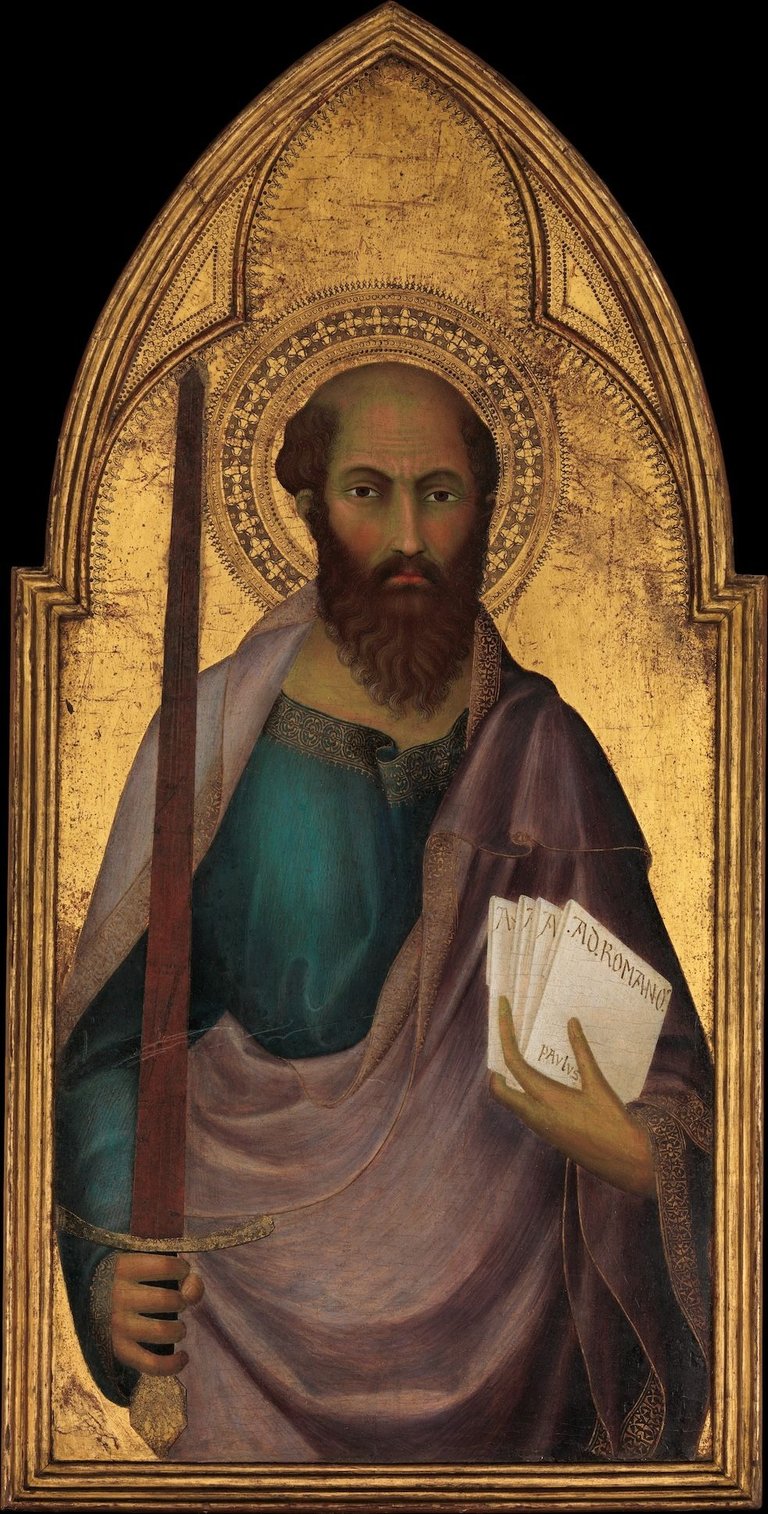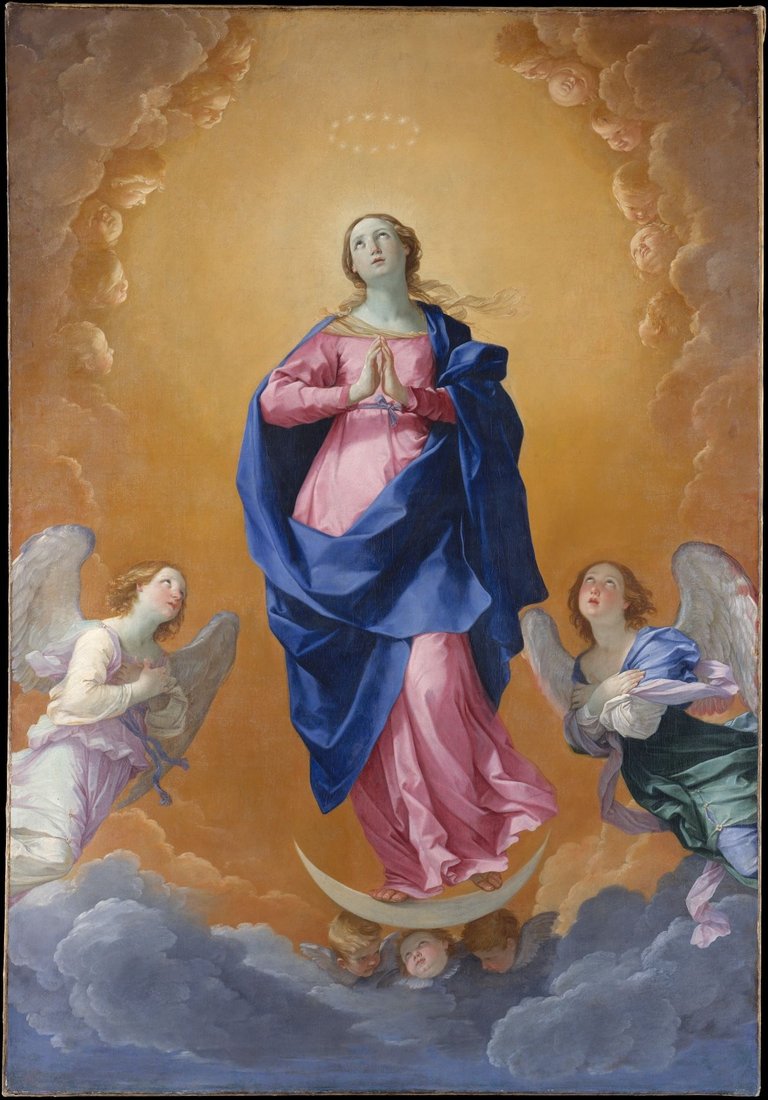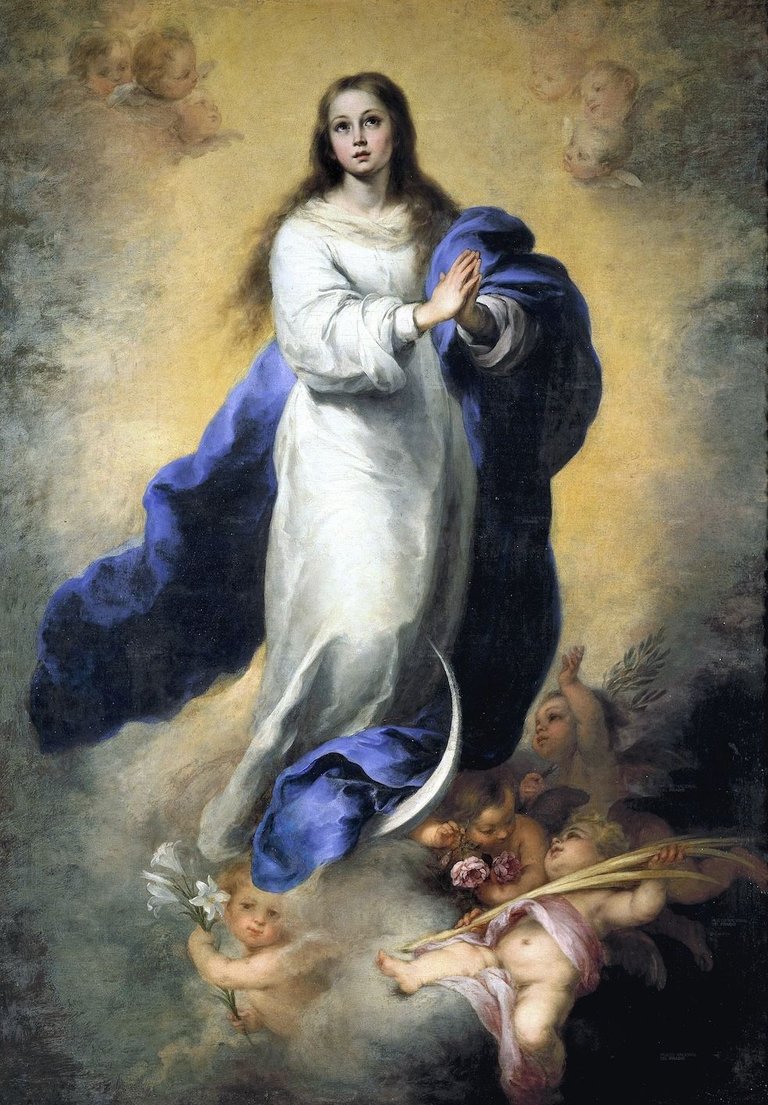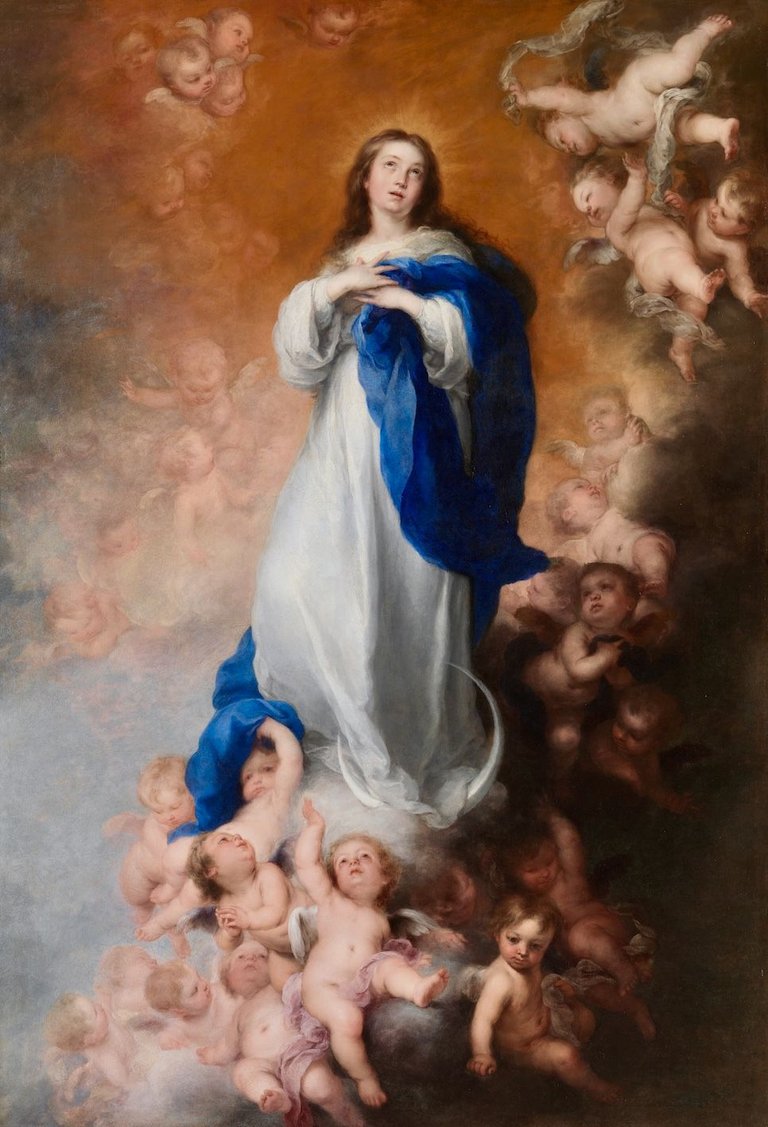"All have sinned," says Paul, so what about the Immaculate Conception of Mary?
"And, [the angel Gabriel] came to [Mary] and said, "Hail, full of grace, the Lord is with you!" (Luke 1:28-30).

Apostle Paul painting by Jan Lievens - Image Source
"Full of grace" – from the Greek Kecharitomene – means that Mary was already full of God's grace, that is, in holiness and sanctifying grace. Therefore, she needed to be without sin to be filled with God's grace.
Many ask, especially those with a Protestant background, "The Apostle Paul said that everyone sinned. So, did Mary sin? Alternatively, if, on the contrary, Mary was born without sin, did Paul make a mistake?"
The biblical passages in question are found in the Letter to the Romans, where the Apostle, speaking of the first father, says: "In whom all have sinned" (Rm 5, 12; cf. 3, 23), and in the First Letter to the Corinthians, where it says: "In Adam all die" (1Cor 15, 22).
Now, if in Adam everyone sinned and died, nothing more logical than concluding that the Virgin Mary, in Adam, sinned and died. After all, everything that is affirmed universally and distributively of a set must be affirmed by all the members of that set.
The Catholic Church teaches that Mary was born without the stain of original sin, which leads us to an apparent impasse: either the Church teaches something that goes against the testimony of Scripture, or Saint Paul would have somehow been mistaken (perhaps by ignoring the privilege of the Immaculate Conception), which would, in turn, derogate from the doctrinal authority of the Apostle and, with it, that of Scripture itself.
This is a false dilemma because Christian doctrine recognizes that Saint Paul is correct in saying that in Adam, all sinned. And at the same time, Mary was preserved immune from all sin, as we will seek to demonstrate below.
The Church does not teach anything contrary to biblical teaching because, in the verses cited, the Apostle speaks of the general condition of men as descendants of Adam by natural generation, which seems to be justified by the use he makes of the term πάντες (πᾶς, in the singular), which although translated as "all," does not always and necessarily mean "everyone."
The Apostle speaks of the general condition of men as descendants of Adam.

Saint Paul, painting by Lippo Memmi - Image Source
In other words, the passages we are examining do not, in and of themselves, require us to read "all" in a distributive sense — as we assumed at the beginning when presenting the problem — but they allow reading in a collective sense (while "all" means the human nature inherited from Adam), or even in an indeterminate sense (while "all" is equivalent to "most," according to some condition that is fulfilled ut in Pluribus, that is, regularly and most of the time).
That this is possible is proven by the Holy Scripture itself, which in several places uses the same term to designate sometimes collectivities, numerically indeterminate groups.
Thus, we read in the first Gospel that, upon the news that the Messiah had just been born, "King Herod was troubled and all Jerusalem (Gr. πᾶσα ἱεροσόλυμα) with him" (Mt 2, 3). Now, it does not seem necessary to interpret πᾶσα (here in the feminine) in the sense that "every one of the inhabitants of the holy city" was disturbed since the intention of Matthew's words is obvious. When rumors spread through the streets of the birth of Christ, much of the city (or those who heard the news) were upset.
Still, in the first Gospel, we find another example that it is not necessary (sometimes even nonsense) to interpret the term πᾶς in an absolute sense, as a synonym for "each and everyone," without possible exception. This is Mt 10:22, where we read the following: "You will be hated by everyone (Gr. ὑπὸ πάντων) because of my name." However, who would conclude that "all" means "absolutely all men"?
If this were the meaning of Jesus' words, it would be at least incoherent that, in the same speech, He sent the disciples to preach the Gospel. After all, if He knew in advance that everyone, without any exception, would hate the Apostles, he would send them on an impossible mission.

The Immaculate Conception – painting by Guido Reni - Image Source
It is evident, therefore, that in the above passage, "all" can be taken in a more or less broad sense, as it means that, out of hatred for the name of Christ, the majority of men would reject evangelical preaching, or that, as a rule, preachers would be hated, without specifying the exact frequency with which this would happen, whether 90 or 80% of the time.
Indeed, the generic use of πάντες, referring to men as descendants of Adam, expresses only one general rule, namely, that whoever has sinned in Adam, as in his moral head, must inherit the consequences of Adam's sin, which are original sin (understood as the habitual deprivation of the sanctifying gifts of grace) and, consequently, subjection to physical, and not just spiritual, death (cf. Gn 2:17).
Furthermore, how do we know that Saint Paul speaks in generic terms there and, therefore, is open to the possibility of a restrictive reading, which contemplates at least one exception (or two).
Noting that the Apostle speaks of all human beings (cf. Rm 5, 12: gr. πάντας ἀνθρώπους, πάντες [ἄνθρωποι]), which should, naturally, also include Christ, who, according to the same Apostle, is the Son of God "born of a woman under the Law" (Gal 4:4; cf. Jn 1:14; Gn 3:15), that is, fully man.
However, it does not include him since the purpose of these sentences is precisely to contrast the first Adam, as a deserving source of sin and death for the human race, with the second, as a meritorious source of grace and supernatural life for all ( whoever wants).
Although the doctrine of the Immaculate Conception is not formulated in the Bible explicitly or in equivalent terms (technically, it is called formal revelation), Scripture itself tells us cases of exceptions to laws or rules that it presents as universal.
The author of the Letter to the Hebrews states, at a certain point, the following principle: "It is appointed that men should die once" (Heb 9, 27), which has always been understood as the universal law of the uniqueness of death.
That is, the general condition of man is such that, in ordinary circumstances, according to the normal course of Providence, he must die only once and then be judged in the divine court.

La Inmaculada del Escorial painting by Bartolomé Esteban Murillo - Image Source
However, the same Providence that established the uniqueness of death as a general norm also provided for certain specific exceptions, as is the case, e.g., of the resurrections carried out by Our Lord.
In the Gospel, we have at least three exceptional cases: that of the son of the widow of Nain (cf. Lk 7, 11), that of the daughter of Jairus (cf. Mt 9, 18; Mk 5, 21; Lk 8, 40 ) and that of Lazarus (cf. Jn 11:1). They all died twice: once before being resurrected, and once after the resurrection (hence it is not a glorious resurrection, but a simple return to life in a passable body) [7].
These events, however extraordinary they may be, do not prove the Immaculate Conception either. However, they are a convincing indication that it would not be contrary to the Letter of the Bible for, by particular divine disposition, someone to be exempt from the universal law of original sin, just as, by special divine arrangement, some people were exempt from the law of the oneness of death.
That Mary was the object of such a privilege cannot be known based solely on the sacred text, apart from ecclesiastical Tradition and the interpretation that has always been given to specific passages referring, in one way or another, to the purest virgin.
Nevertheless, the fact that something cannot be known solely based on the Bible, taken as a set of texts disconnected from the previous Tradition that inspired them and in which they were created and read, does not mean that this thing is false nor — as we believe we have shown to the throughout this article — contrary to biblical teaching.
It simply means that Scripture needs to be formally sufficient; it does not alone constitute the norm for its interpretation, nor does it offer an exhaustive and explicit catalog of all the truths the believer must believe. This has never been the feeling of the Church, the Fathers, and Christians regarding the divine Scriptures. Nor, therefore, that of the Apostle Paul.
We must understand that free examination of the Bible can lead to interpretation errors. It is important to remember that the Holy Church wrote the entire New Testament and created the Bible in the 4th century.
We must ask what the Catholic Church teaches, not what the text says. After all, the Bible itself says that the Church is the Pillar and Support of Truth (I Timothy III, 15) because the Church is the one that correctly interprets the Bible.
Without the descent of the Holy Spirit at Pentecost, the Church would not have been born, and the Tradition inspired by this same Spirit affirms and professes from a very early age that Mary was conceived without sin.

Immaculate Conception, painting by Bartolomé Esteban Murillo - Image Source
Without the descent of the Holy Spirit to inspire the apostles and disciples of Christ, who imbued with this power, continued his work, spreading his teaching, healing, casting out demons, and performing thousands of miracles throughout the centuries until today, Jesus would hardly be remembered.
There was apostolic succession, from the apostles to the bishops who ordained new bishops until today. The Church of Christ is a living tradition perpetuated throughout history. This is why many saints performed countless miracles over the centuries, and the wonders continue.
This Tradition of inspired Saints who continued the work of Our Lord, it is nothing more than the Holy Catholic Church transmitting the knowledge of the Truth through the generations, with authority and power, as Christ himself said: "Whoever believes in me will do the works that I do, and he will do even greater ones than these" (John 14:6-14)
In the Gospel of Matthew 17, 18, Christ clearly says:
"If he refuses to listen to them, tell it to the Church. Moreover, if he refuses to listen to the Church, let him be to you as a pagan and a tax collector."
And in Timothy 3:15:
"...that you may know how you ought to walk in the house of God, which is the church of the living God, the pillar and ground of the truth."
Bibliography; V. Zubizarreta, Theologia Dogmatico-scholastica, A. Tanquerey, SS, Brevior Synopsis Theologiæ Dogmaticæ, Pe. J. Prado, CSSR, Prælectiones Biblicæ. Propædeutica Biblica and H. Simón, CSSR, Prælectiones Biblicæ. Novum Testamentum.

Follow me on Twitter
And this is why Protestants will never see eye to eye with the Catholic church. Scripture, the word of God is above all. And we're taught in Scripture...We are to follow God, not man.
It's fascinating really, how such division all comes from that fact. Catholics put the church above all, while Protestant put the bible above all.
And I'm not sure that will ever change. All we can do really, is pray for each other I guess lol
Hello @kingdombible. Peace and goodness. True, but over time, most Protestants who genuinely seek the truth end up converting to Catholicism, as it is the Bible itself that affirms the primacy of the Church. The notion of Sola Scriptura is nonsense; after all, the Church wrote and selected the books of the Bible; the Bible did not fall from the skybound. God bless you.
It's fascinating, because we believe the opposite. But alas...We will agree to disagree :)
But weren’t men the ones who chose what to write in the scriptures, and later on what to include into (or hide from) the Bible which exists today?
2 peter 1:21, 2 timothy 3:16, john 17:17....The Bible is inspired, written by men for sure, but through inspiration from God.
@untamed-essence Welcome. Peace and good. Thanks for commenting.
Those who wrote the New Testament were, in some cases, the Apostles of Christ themselves. In other instances, the disciples of the Apostles and those who selected which books were inspired by God and should make up the Bible were mostly the Holy Fathers, who are those who learned and were ordained directly by the Apostles or by their closest disciples who knew them in life, that is, by those who learned directly from the Apostles.
All these men belong to an oral and practical tradition taught by Jesus Christ himself and then transmitted. There is a direct line of succession since Christ ordained the Apostles, and the Apostles ordained countless other bishops and priests successively to this day.
Ah, this supposed concealment does not exist, as the number of witnesses to everything Christ did and taught was enormous. The oldest manuscripts also demonstrate that there were no relevant adulterations, just minor inaccuracies that do not change the meaning of the text.
May God always bless you.
Then there is also a problem with Paul himself and whether or not one will trust that he was truthful (and correct) in his interpretations of Christ and the ways Christ was teaching when he was actually alive as a human being.
This doesn't make sense because Paul lived with most of the other apostles and direct disciples of Jesus. There was a community in which everyone was very close; if he preached something contrary to what Jesus taught, he would have been unmasked from the beginning; note: The oldest texts in the Bible are written by Paul himself, some apostles who knew Jesus in life only wrote their gospels years later.
Maybe, I can’t really prove or disprove it, so I am open to many things 😊 There is just no way to confirm it myself — I would have to do very extensive research in religious studies (and most likely learn Hebrew, Greek, and Latin) to achieve better understanding. Even just the fact that God of the Bible refers to himself as “we” in the very beginning throws me off. Unless it’s a figure if speech (and how would we know if it was), clearly God Yahweh (if it’s even him in the Bible) isn’t the only higher entity out there.
Faith I know, but my faith is not in the Church or any priests, it mostly has to do with personal experiences and more natural phenomena. History is fascinating.
Congratulations @marianaemilia! You have completed the following achievement on the Hive blockchain And have been rewarded with New badge(s)
Your next target is to reach 7000 replies.
You can view your badges on your board and compare yourself to others in the Ranking
If you no longer want to receive notifications, reply to this comment with the word
STOPCheck out our last posts: